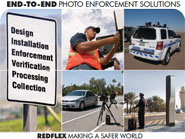8/29/2012
US Photo Enforcement Market Becoming Less ProfitableNumber two red light camera company profit drops 10 percent in North America as cities grow dissatisfied with photo ticketing.

As an increasing number of cities decide to drop the use of red light cameras and speed cameras, the photo enforcement vendors are beginning to feel the pinch. The second-largest provider of automated ticketing machines, Redflex Traffic Systems, admitted Thursday to Australian Securities Exchange investors that the firm's profit in North America has slipped 10.1 percent in the past twelve months.
In 2011, Redflex pulled in $103 million from operations in the United States and Canada. For the financial year ended June 30, 2012, that figure was just $92 million. The severity of the drop is masked by exchange-rate fluctuations. In 2011, Redflex lost $17 million due to a 12 percent rise in the value of the Australian dollar against the US dollar. That means the real value of the plunge in Redflex revenue is closer to twenty percent.
"Redflex continues to face challenges raised through local voter initiatives and referendums," the company's preliminary 2012 report to investors explained. "In FY12, citizen initiatives caused the termination of several Redflex contracts, including the Albuquerque contract."
The unpopularity of speed cameras over the past twelve months is undeniable. In November, voters in seven cities went to the ballot box and said 'no' to photo ticketing. Major cities in California, many of which were under contract with Redflex, decided to drop their cameras, including Riverside, Emeryville, Yuba City, Glendale, Gardena, Grand Terrace, Los Angeles and Pasadena. Last year, Redflex reported its contract renewal rate was 88 percent. This year, the figure slipped to 82 percent. Redflex has attempted to save face by lining up new contracts in very small cities like Bel-Ridge, Missouri; Fairview, Oregon and Irondale, Alabama. The company also boasts of signed contracts with five cities in New Jersey, but they cannot install cameras because the state department of transportation has closed the photo enforcement pilot project.
Despite the American setback, overall Redflex profit increased in 2012. The company's Australian business and camera offerings in Middle Eastern countries have boomed, expanding 18 percent in the past financial year. Redflex secured a $5 million interim contract with Abu Dhabi for forty speed cameras and hopes to expand that to 435 cameras worth $30 million. The firm expects $25 million from its deal with Saudi Arabia. The latter programs are particularly successful -- revenue is up 47 percent -- because public opposition to cameras is not a factor under authoritarian rule.
Redflex insists, however, that it is not giving up on North America. It cited success in convincing leaders like Virginia Governor Bob McDonnell (R) and Chicago, Illinois Mayor Rahm Emanuel (D) to implement measures drafted by the red light camera industry.
"Redflex also supported the passage of legislation allowing speed-based photo enforcement in park and school zones in Chicago, Illinois," Redflex wrote. "Furthermore, positive reform legislation was passed in Virginia and Washington which should support industry initiatives and growth in each state."
To boost its ticketing operation, Redflex also paid $7.4 million in May to buy the "Smart Bus" ticketing system that turns school buses into automated ticketing machines throughout the US.


